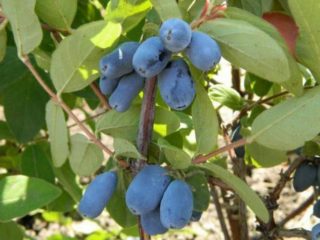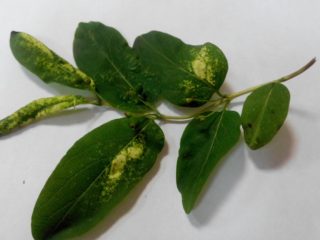Content
- 1 What to plant next to honeysuckle
- 2 Honeysuckle compatibility with other plants
- 2.1 Honeysuckle and apple tree compatibility
- 2.2 Honeysuckle and currant compatibility
- 2.3 Honeysuckle and gooseberry compatibility
- 2.4 Honeysuckle and raspberry compatibility
- 2.5 Honeysuckle and cherry compatibility
- 2.6 Honeysuckle and blueberry compatibility
- 2.7 Honeysuckle and pear compatibility
- 2.8 Honeysuckle and Blackberry Compatibility
- 3 How to choose the best neighbors for honeysuckle
- 4 Experienced gardening tips
- 5 Conclusion
Honeysuckle is an upright climbing shrub found in most European gardens. The plant is not so in demand among Russians, however, due to its unpretentious care, as well as tasty and healthy fruits, its popularity is growing rapidly. Not all crops can be planted next to honeysuckle, since the shrub places high demands on its neighbors, and its roots emit toxic compounds that impede the development of nearby plants.
What to plant next to honeysuckle
You need to plant a bush in an open, sunny place, protected from the wind. Autumn is considered the optimal time for planting, since plants planted in the spring are characterized by poor survival rate. The culture is famous for its high frost resistance, and its berries are rich in vitamin C, malic and citric acids, galactose, sucrose, fructose, glucose, minerals and rare trace elements.
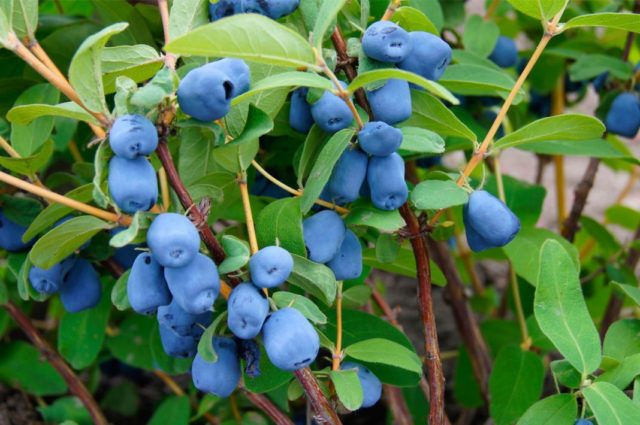
The crop is used to make mousses, jelly, juices, jams, marmalades and preserves.
Therefore, honeysuckle is gradually appearing on the personal plots of Russian gardeners.
In the wild, it can be found in the neighborhood of buckthorn, dog rose, hawthorn, juniper, aspen, fir, garden maple and other crops. Many annual crops such as cucumbers, peppers, tomatoes and watermelons coexist well next to the bush. All representatives of melons have a positive effect on the shrub, accelerating the rate of its development and increasing productivity.
Honeysuckle compatibility with other plants
Not all plants can be planted next to honeysuckle, since the root system of the bush releases special substances that can harm other crops. Novice gardeners often make the mistake of planting absolutely unsuitable plants nearby. The bush does not get along well next to many pome and stone fruits, as well as barren crops.
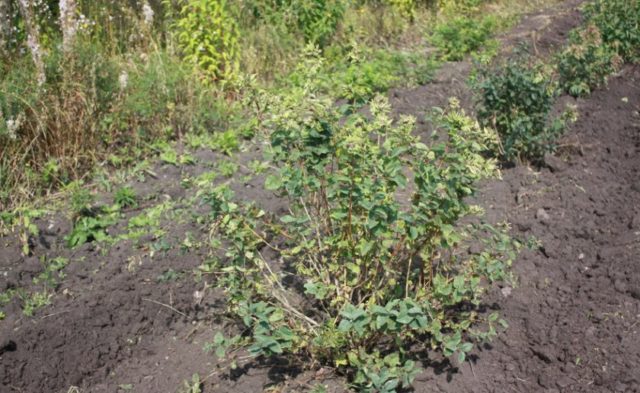
Honeysuckle does not tolerate dry air, it needs high humidity
Apricot, walnut and bird cherry poison the soil around them with toxic substances that can cause serious damage to the honeysuckle bush. Rowan and spruce provide a lot of shade and take away most of its nutrients and moisture. Strawberries are fast growing and require a lot of water and feeding, which is often taken away from neighboring plants.
Honeysuckle and apple tree compatibility
Planting an apple tree next to honeysuckle is possible only with a certain experience in gardening work. The compatibility of these crops is not the highest; with their alternation, the soil will be overloaded, and the plants will begin to lag behind in development.
Honeysuckle and currant compatibility
Currant and honeysuckle are crops with great similarities. They are distinguished by frost resistance and unpretentious care.The chemical compatibility of shrubs is quite high, so they can be planted nearby without fear of negative consequences. The neighborhood of honeysuckle with black currant will be successful, it will increase the productivity of two crops. The shrub does not get along with the red currants planted nearby.
Otherwise, all crops will suffer from a lack of nutrients in the soil.
Honeysuckle and gooseberry compatibility
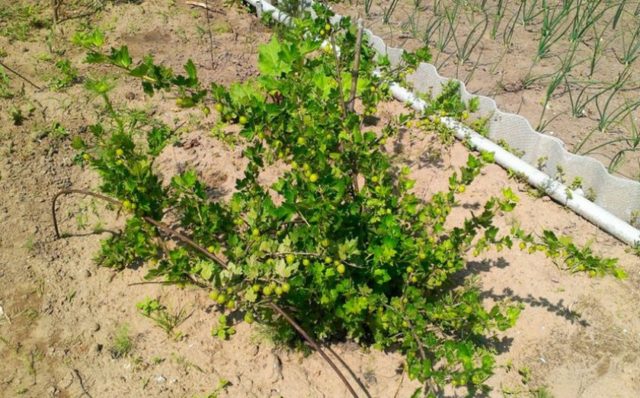
Honeysuckle is a light-loving plant that does great next to gooseberries.
The compatibility of the two crops is quite high, which allows them to be planted side by side without any negative consequences. It is only necessary to maintain the optimal gap between seedlings - at least 1.5 m.
Honeysuckle and raspberry compatibility
Raspberries are considered a very freedom-loving culture that does not tolerate any neighbors around them. It has a powerful root system that rapidly develops and interferes with the life of the surrounding plants. However, there are cultures near which raspberries feel quite at ease. These include black currant, pear, plum and honeysuckle, as well as barberry and various types of juniper. Experienced gardeners recommend planting oats and vetch in the aisle of raspberry to enrich the soil. The combination of cereals and legumes contributes to the saturation of the soil with nitrogen and suppresses the development of weeds.
Honeysuckle and cherry compatibility
Planting cherries nearby is not a good idea.
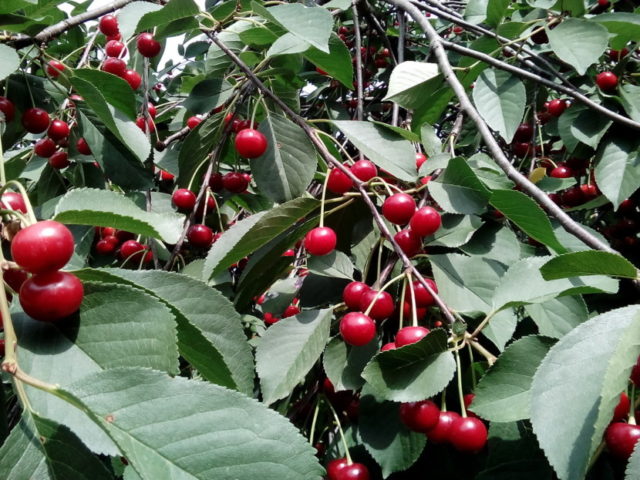
The fruit crop is distinguished by a large number of growths and gives abundant shade.
However, experienced gardeners often plant plants next to each other without negative consequences for the berries. For this, the shrub is placed next to the trunk circle at a distance of at least 1.5-2 meters.
Honeysuckle and blueberry compatibility
Blueberries like soil that is acidic, which is not the best for honeysuckle. However, the chemical composition of plants is largely identical, so you can plant them side by side if certain conditions are met. The gap between the bushes must be at least 4 meters. Otherwise, they will create a lot of obstacles to each other's development.
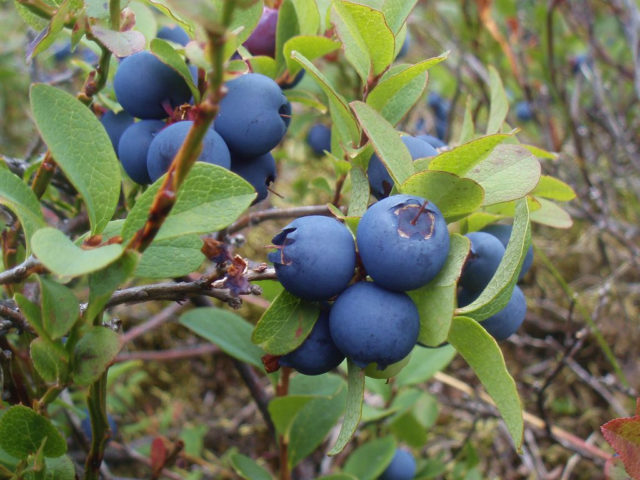
Since blueberries are more thermophilic, honeysuckle should be planted from the north side.
It will protect blueberries from strong winds and cold.
Honeysuckle and pear compatibility
Planting a pear nearby is very risky, since the shrub has a depressing effect on this fruit crop. There should also be no barberry, beech and juniper near the pear, which can provoke corrosion of the root system.
Honeysuckle and Blackberry Compatibility
Planting a blackberry next to a shrub is not recommended, since young blackberry plants require a lot of free space for full development. Planting near honeysuckle is preferable to kumanik (an upright growing variety of blackberries with harsh shoots). In the case of planting dews (a variety with creeping shoots), the neighborhood is unlikely to be successful. Therefore, before starting garden work, you should pay special attention to the choice of a blackberry variety.
How to choose the best neighbors for honeysuckle
The compatibility of honeysuckle with fruit trees is very high, provided that it is not planted in their shade. The best neighbors for the shrub are such fruit crops as apple, rose hips, grapes, black and red currants, plums, cherries, barberries and quince.
Otherwise, in a short time period, it will fill the area of the garden plot, giving abundant root shoots, which will greatly impede the development of neighboring plants.
You can not plant a bush with all barren crops. The neighborhood with forget-me-not, lily of the valley and ferns is considered successful.Flowers have a very useful skill - to attract bumblebees and bees thanks to their bright aroma. With their help, the development of honeysuckle is accelerated, and the rates of its fruiting increase.
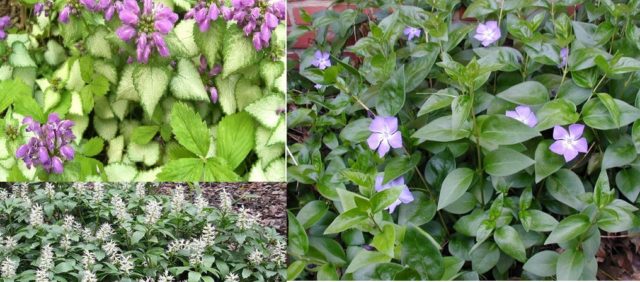
The proximity of the shrub with various ground cover grasses, such as pachisandra, periwinkle and yasnotka, will be useful
They inhibit the growth of weeds and enrich the soil composition.
Experienced gardeners recommend planting black elderberry, Chinese lemongrass, hawthorn and other medicinal plants next to the bush. The neighborhood with coniferous crops, such as juniper and decorative species of thuja, is considered favorable. Despite the impressive height of this tree, its crown is not very dense. Therefore, crops growing nearby will not suffer from an overabundance of shade. Spruce is a harmful neighbor for most plants, but honeysuckle feels great next to ephedra.
Many garden crops are able to get along well next to honeysuckle. For example, cucumbers are suitable for short daylight hours, high humidity and soil with a neutral pH. Therefore, they can be planted close to shrubs. The neighborhood with collard greens, basil, parsley, dill, beets and onions will be successful. The plant thrives on most stone fruit crops.
Experienced gardening tips
When planting honeysuckle on the lawn, you need to maintain a near-trunk circle, the diameter of which must be at least one meter. Novice gardeners are often alarmed by the fact that the flowers of the shrub are bisexual. Therefore, pollination of a crop cannot take place without the participation of insects. For high yields, the plant needs cross-pollination with different varieties planted nearby. One honeysuckle bush on the site will not bear fruit.
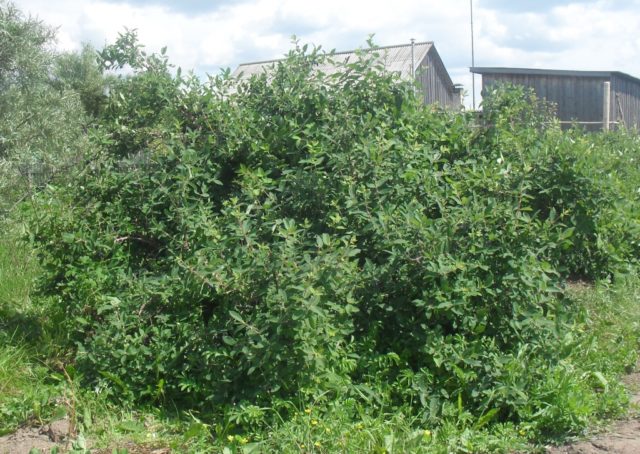
If neighbors have honeysuckle plantings, you can get by with one bush on the site, which will definitely bear fruit
You need to take a responsible approach to the selection of varietal pairs. Good cross-pollination is distinguished by the Blue Spindle with Morena and Dlinnoplodnaya with Chelyabinka.
Conclusion
Not all plants can be planted next to honeysuckle. The recommended distance between the bushes should be at least 2.5 meters, otherwise mature specimens can literally get stuck in each other. In this case, the flowers cease to pollinate, and the collection of berries becomes much more difficult. The compatibility of honeysuckle with other crops is quite high if the shrub is not in their shade.



